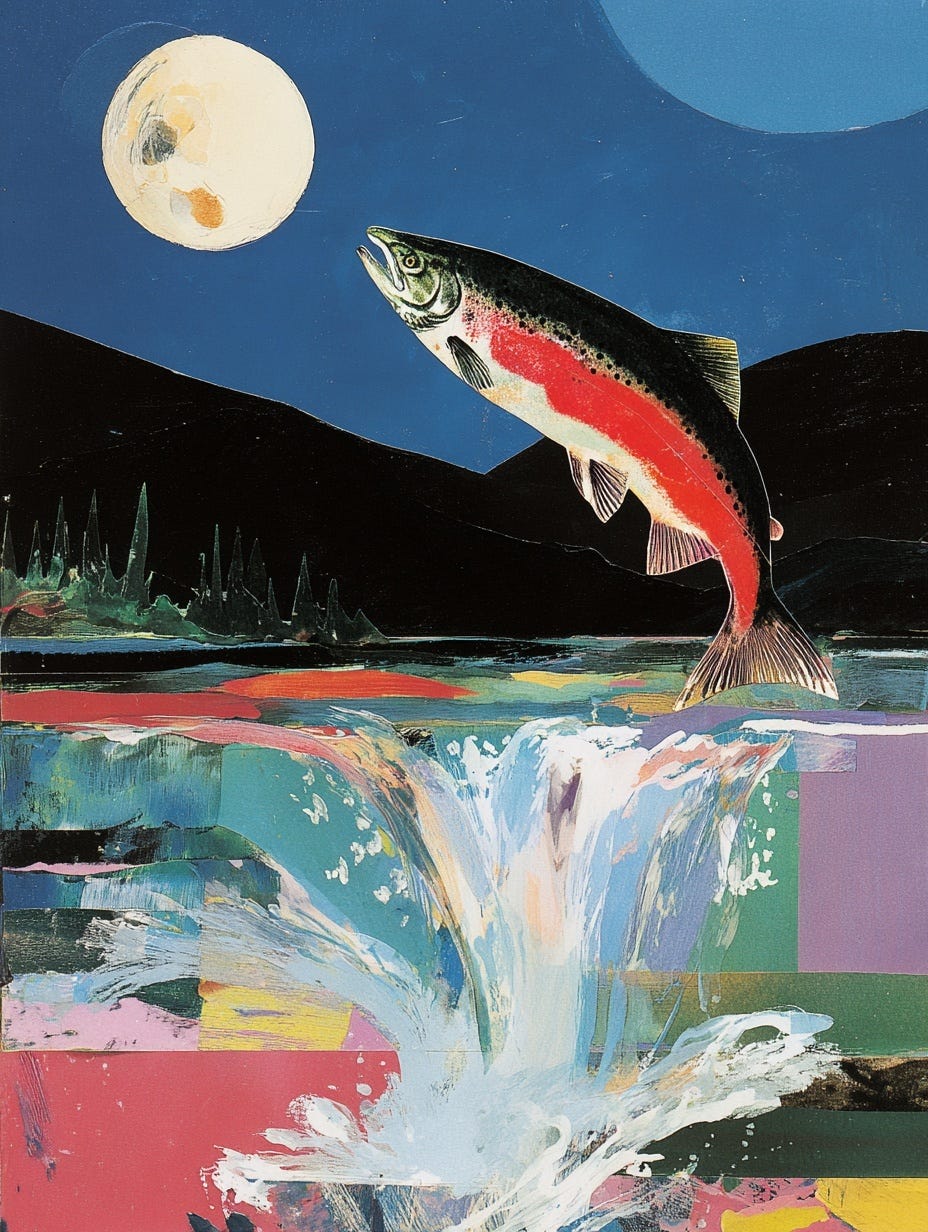Dear Lunatics,
Tonight, the Salmon Moon will squirm into view.
Or at least it will if you are far from the waterlogged Northeast, where soggy clouds are bobbing around the night sky like sofa cushions in a flooded basement.
This morning, we were woken by an Emergency Flood warning screeching from every cell phone within a 10-mile radius.
So many roads flooded that my visiting nurse, on her way with the bags of saline that keep me hydrated, had to turn back, leaving me dehydrated this evening as I stare out at a world underwater.

At least the salmon must be happy.
This is the time of year when they return to the exact streambed where they were born, riding the high tides (helped along by flash floods and full moons) as they battle upstream, sometimes as far as 900 miles inland.
I can almost hear the raucous splashing tonight as they surge in swollen river mouths and estuaries, driven by an all-consuming need to go back to where it all started for them—to the gravel nest that their mother, under the glow of a full moon years ago, excavated, with a sweep of her tail, to hide her fertilized eggs beneath black stones and shining pebbles.
Young salmon spend months in these hideaways, followed by a few timid years darting to and fro among river rocks—camouflaged in the moon-dappled water by a pattern of vertical bars across their backs. When they finally grow brave, they wait for the dark of a new moon and make a break for the open ocean.
Salmon swim thousands of miles across the Pacific or Atlantic, spending up to five years exploring the wide watery world. But no matter how far they cruise, they always come home—and not just to their native river, but to the exact streambed where they were born.
Their attunement to the Earth's magnetic field helps them navigate, as do the poses struck by the stars and the Moon in the sky. But once they approach their native coast, their sense of smell takes over.
Even if one single drop of its childhood waters was diluted in 20 Olympic swimming pools, a salmon could sniff it out.
Equipped with this freakish olfactory power, salmon will nose their way through a maze of tributaries. If necessary, they will leap ten feet in the air to clear a waterfall. They will do anything to make it home.
And it’s not pretty.
Embarking on its final migration, a salmon’s body begins to collapse. Its skin loses its sheen and begins to slough off. It stops eating, burning through fat, muscle, and finally tissue. Its internal organs break down. Yet even as it is rotting alive, it struggles upstream.
Once it spawns, and its new batch of eggs is neatly concealed under gravel, a salmon promptly dies. Some drift downstream while others remain, feeding the vegetation under whose shadow they once trembled as freshly hatched beings.

I feel a great kinship with salmon and their morbid mania to return home.
Growing up, I was possessed by the same totalizing drive—only I was determined to get away from home.
To make it to the open ocean and never come back.
I would do any job to pay the rent, I remember thinking. I’d even be a fish counter—one of those men and women with unfathomable attention spans who spend their days in the bowels of large dams, staring through an underwater window, logging how many salmon swim past, the salmon’s unblinking eyes peering in at them, fins waving hello or goodbye.
Tonight, as I stare out the streaked window of my childhood bedroom, I feel fortunate.
I may have returned to this small room with its lingering miasma of adolescent misery, as though I were beholden, salmon-like, to a strict elliptical life cycle…but still, I consider myself lucky.
I only have one salmon to count tonight.
One Salmon Moon that will swim across my window.
A moon that I will see, if the clouds part, paddling in all its silver glory across the July night before it returns, inexorably, to the place where it started.
See you on the Sturgeon Moon!
—WD







Even dehydrated, you continue as a thoughtful reservoir of information and insight! Wonderful to be with you again at the actual Full Moon.
Towards healing and wholeness -- always for you (and especially for the MBTA, lol).
Thank you. I love your moon stories, your stories of the moon we all share.